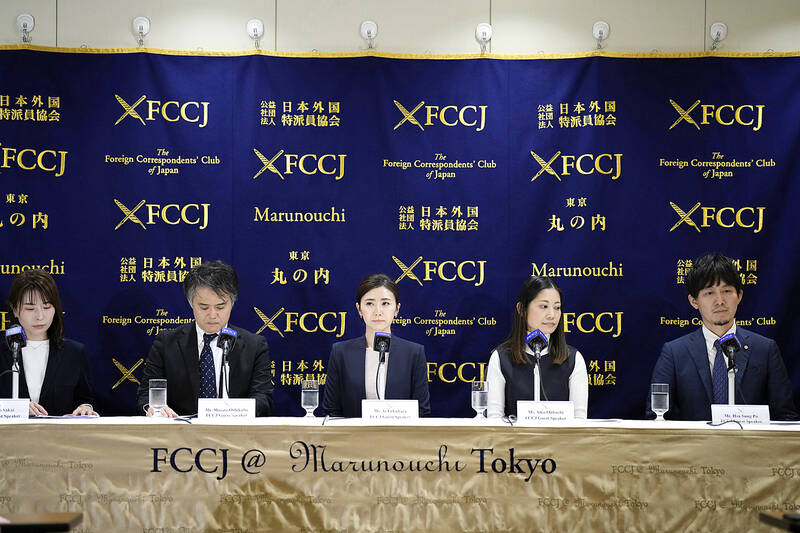A once-beloved Japanese table tennis star said yesterday she has reached a settlement with her ex-husband, a Taiwanese star in the sport, ending a high-profile battle over custody of their 4-year-old son.
The move comes at a time when Japan's parliament is discussing legislation to introduce a dual custody system following similar high-profile custody cases brought by foreign husbands against Japanese women.
“From now on, I will cooperate with Mr. Chiang in raising our children,” Ai Fukuhara said at a news conference announcing that she and former husband Chiang Hung-chieh (江宏傑) had reached an agreement on their son's custody.

Photo: Eugene Hoshiko, AP
She bowed deeply and left without taking any questions, leaving her two lawyers to do so on her behalf, along with their counterparts representing Chiang.
Fukuhara has handed over their son to Chiang to live in Taiwan, where their daughter already is based, the lawyers said.
The former couple have reached an agreement on joint custody and have worked out details for their son to spend time with his mother, Chiang's Japanese lawyer Aiko Ohbuchi said. The lawyers declined to give further details.
The couple were divorced under Taiwanese law in July 2021 ending their five-year marriage. They agreed to share custody of their two children who had been living with Chiang. Fukuhara returned to Japan with the boy to spend the summer in 2022, but cut off contact with Chiang, refusing to bring the son back to Taiwan and triggering their custody battle.
Chiang, in a statement read by his lawyers, thanked the Japanese court for fair judgement and support by the people.
The settlement comes just as Japan's Cabinet submitted a bill allowing joint custody for parliamentary approval. The move, however, has sparked opposition from women's and other rights groups, saying the dual custody system would put victims of domestic violence by their partners at risk.
Unlike many other countries, Japan doesn’t currently allow legal dual custody of children for their divorced parents. Only one parent can take the children, though the other parent can gain visitation rights. In some cases, the parent with custody cuts off contact with the other one and in some others those without physical custody stop required child support payments.
Chiang, after winning a Taiwanese court decision, also obtained a Japanese court order for Fukuhara last July to immediately return the child to him. But Fukuhara took the boy to China, apparently to escape Japanese jurisdiction and avoid being compelled to hand over the child. Chiang’s subsequent filing of a criminal complaint accusing Fukuhara of child abduction eventually led to their settlement in December.
Ohbuchi, Chiang's lawyer, said she was uncertain how the case could be resolved in Japan, where the concept of joint custody is not widely or appropriately understood.
She said the Japanese courts made a very appropriate and fair decision that is compatible with the Taiwanese decision and that the joint custody arrangement was possible even under Japan’s existing system.
The problem stems from Fukuhara’s refusal to bring the child back to the primary parent after the court-ordered visitation period ended, said Fukuhara's lawyer Nao Sakai. “Prolonging the dispute was not desirable for the boy and it was good we could work out the settlement.”

Aftershocks from a magnitude 6.2 earthquake that struck off Yilan County at 3:45pm yesterday could reach a magnitude of 5 to 5.5, the Central Weather Administration (CWA) said. Seismological Center technical officer Chiu Chun-ta (邱俊達) told a news conference that the epicenter of the temblor was more than 100km from Taiwan. Although predicted to measure between magnitude 5 and 5.5, the aftershocks would reach an intensity of 1 on Taiwan’s 7-tier scale, which gauges the actual effect of an earthquake, he said. The earthquake lasted longer in Taipei because the city is in a basin, he said. The quake’s epicenter was about 128.9km east-southeast

GENSLER SURVEY: ‘Economic infrastructure is not enough. A city needs to inspire pride, offer moments of joy and foster a sense of belonging,’ the company said Taipei was named the city with the “highest staying power” in the world by US-based design and architecture firm Gensler. The Taiwanese capital earned the top spot among 65 cities across six continents with 64 percent of Taipei respondents in a survey of 33,000 people saying they wanted to stay in the city. Rounding out the top five were Vietnam’s Ho Chi Minh City (61 percent), Singapore (59 percent), Sydney (58 percent) and Berlin (51 percent). Sixth to 10th place went to Monterrey, Mexico; Munich, Germany; Sao Paulo, Brazil; Vancouver; and Seoul. Cities in the US were ranked separately, with Minneapolis first at

The New Taipei City Government today warned about the often-overlooked dangers of playing in water, and recommended safe swimming destinations to cool off from the summer heat. The following locations in the city as safe and fun for those looking to enjoy the water: Chienshuiwan (淺水灣), Baishawan (白沙灣), Jhongjiao Bay (中角灣), Fulong Beach Resort (福隆海水浴場) and Sansia District’s (三峽) Dabao River (大豹溪), New Taipei City Tourism and Travel Department Director-General Yang Tsung-min (楊宗珉) said. Outdoor bodies of water have variables outside of human control, such as changing currents, differing elevations and environmental hazards, all of which can lead to accidents, Yang said. Sudden

Tropical Storm Podul has formed over waters north-northeast of Guam and is expected to approach the seas southeast of Taiwan next week, the Central Weather Administration (CWA) said today. The 11th Pacific storm of the year developed at 2am over waters about 2,660km east of Oluanpi (歐鑾鼻), Pingtung County — Taiwan's southernmost tip. It is projected to move westward and could have its most significant impact on Taiwan on Wednesday and Thursday next week, the CWA said. The agency did not rule out the possibility of issuing a sea warning at that time. According to the CWA's latest update, Podul is drifting west-northwest